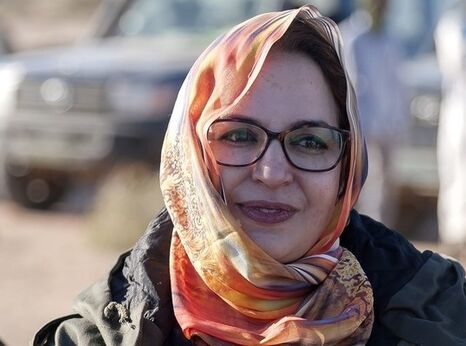Morocco/Western Sahara: Sahrawi activist at risk of further assault

Photo: © Getty Images
On the morning of 10 May, when security forces raided Sultana Khaya’s home, they arrested three activists -- Babouzid Mohammed Saaed Labhi, president of the Collective of the Saharawi Human Rights Defenders (CODESA), Salek Baber and Khaled Boufraya- who had managed to sneak past the security forces stationed outside the house weeks earlier to support Sultana Khaya and her family because they felt under threat. After arresting the activists that day, security forces tortured them for several hours and then dumped them in a remote area in the desert,
Sultana Khaya is the president of an organization called the ‘League for the Defense of Human Rights and against Plunder of Natural Resources’ and is known for her vocal activism in defence of the right of self-determination for the Sahrawi people. Her and her family’s unlawful detention is part of a wider crackdown by the Moroccan authorities on Sahrawi activists and critical voices within Western Sahara, which escalated following clashes between Morocco and the Polisario Front in November 2020. A growing number of Sahrawi activists have been subjected to targeted attacks in the past months by the security forces away from the attention of international media.
Under international human rights law, house arrest is considered as a form of detention and requires certain safeguards to be considered lawful. According to the UN Human Rights Committee’s General Comment 35 on Article 9 of the International Covenant on Civil and Political Rights liberty-depriving measures, including house arrest, must not be arbitrary and must be carried out with respect for the rule of law and allow a meaningful and prompt judicial review of detention. Deprivation of liberty, including in the form of house arrest, is arbitrary when it results from the exercise of human rights, including the rights to freedom of expression, association and peaceful assembly.
Western Sahara is the subject of a territorial dispute between Morocco, which annexed the territory in 1975 and claims sovereignty over it, and the Polisario Front, which calls for an independent state in the territory and has set up a self-proclaimed government-in-exile in the refugee camps in Tindouf, southwestern of Algeria. A UN settlement in 1991, which ended fighting between Morocco and the Polisario Front, called for a referendum to be put to the people of Western Sahara to exercise their right to self-determination by choosing independence or integration into Morocco. The referendum has not been held amid ongoing disputes about the process of identifying who may vote in the referendum.
In recent years, access to Western Sahara has grown increasingly difficult for external monitors as the human rights situation has continued to deteriorate. In 2020, Moroccan authorities prevented at least nine lawyers, activists and politicians from access to Western Sahara. Journalists have also been denied access which makes the struggle of human rights activists widely uncovered. The UN Security Council has been ignoring calls by Amnesty International and others to add a human rights component to the United Nations Mission for the Referendum in Western Sahara (MINURSO), which would allow for monitoring and reporting on human rights abuses, as is done by the vast majority of comparable UN missions around the world.